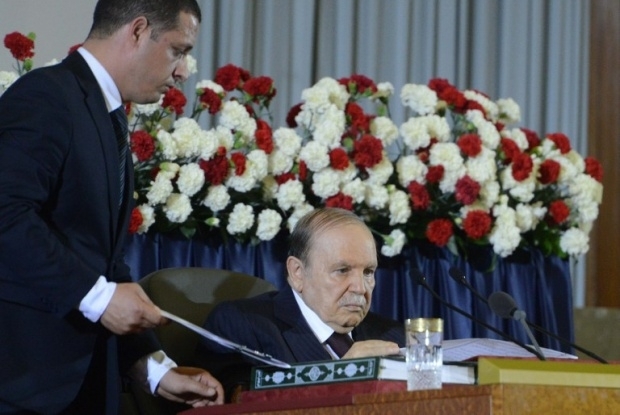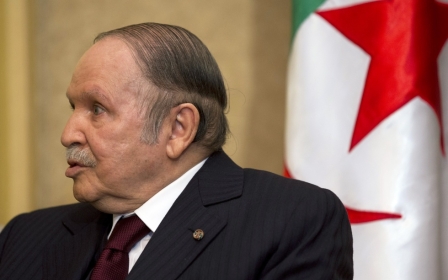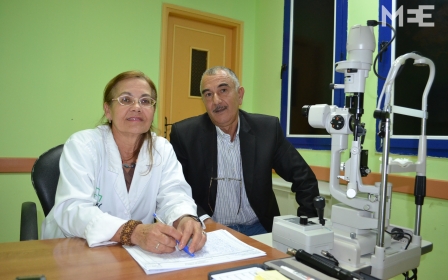Algeria's constitution: Too tight a fit for Bouteflika

ALGIERS - "The only reason why Abdelaziz Bouteflika intends to revise the constitution is because the Americans and the French, since the outbreak of the Arab revolts, have asked him that to provide guarantees for the regime’s opening-up process," an Algerian official told Middle East Eye.
"But for him, the constitution is just a piece of legislation like any other, which one can tamper with in favour of personal interests."
It is with much apprehension that this state official, who spoke to MEE on the condition of anonymity, waits for the next revision of the constitution, promised for the end of the year by Ahmed Ouyahia, minister of state and director of the office of the presidency.
In the entourage of the head of state, this announcement has triggered some cynicism. No one really believes in the reform of the basic text that has been underway since 2011.
"One must get back to the context of that time," a source close to the presidency told MEE. "Like Morocco, we were afraid of being contaminated by the Arab Spring. Mohamed VI [the King of Morocco] announced a constitutional reform in favour of new freedoms. As for Abdelaziz Bouteflika, he asked Abdelkader Bensalah, president of the national council [the Senate], as well as Major General Mohamed Touati, his military adviser, to conduct consultations with the political class and civil society for the same purpose."
There is a problem: neither the organisations nor the opposition - both of which view this project as a new way to buy social peace - have supported the project.
Three years later, during the summer of 2014, Abdelaziz Bouteflika, re-elected for a fourth term, revived the consultations, this time with Ahmed Ouyahia overseeing the process. Although credible opposition parties and some political figures, including former prime minister Mouloud Hamrouche, still refuse to play the game, they nonetheless will release a draft that is not yet approved either by parliament or by referendum.
'Great ideas and nice words'
"It will talk about the 'freedom of expression,' the 'greater prerogatives for the parliament' or even of an 'independent judiciary,' great ideas and nice words that everyone wants to hear. But that’s all. Because there will be no implementing decree," a presidential advisor told MEE in a cynical tone.
"The text will continue to grant superiority to the presidency. In other words, nothing will change."
The constitutionalist Fatiha Benabbou, who has studied the text from every possible angle, said: "We often compare the Algerian constitution to the French or American one describing it as 'hyper-presidential' but that is not quite true," she explained to MEE.
"In reality, it is a presidential constitution, where the president is not being challenged by a counter-power. He represents the unity of the nation, like the ancient kings of France. He is both the legislator [just like the parliament, which he can dissolve unconditionally], the governor [although in appearance it is the prime minister who takes political responsibility instead of him] and the president of the Higher Judicial Council. He also appoints three key posts, including the president of the Constitutional Council."
"In conclusion, he has control over all the institutions."
'Burnoose'
This concentration of power leads one former minister to conclude: "On the contrary, I think that Bouteflika, like all Algerian presidents before him, wishes to update his constitution, to at least set in stone all his unfinished projects and prove that he had a political vision."
"For all those leaders who have grown up in a culture of coups, in an opaque system’s intricacies, military in essence, the constitution is like a Burnoose [a long woolen cloak used by shepherds], a way to be wrapped in civil legitimacy."
The 1976 constitution had allowed president Houari Boumediene to sharpen the 1963 constitution adopted by his predecessor Ahmed Ben Bella, by installing clear institutions, while strengthening political choices (the socialist option) and ideological ones (Arabic and Islam as the state’s language and religion). With the 1989 constitution, his successor, Chadli Bendjedid, had made his own choices: the very beginnings of an economic open-door policy and the end of the one-party rule, the basis of the political system. In 1996, President Liamine Zeroual created the Council of the Nation, the Algerian senate.
"The priority at the time was to strengthen institutions in a country ravaged by war," said the former minister of Bouteflika. "Avoiding a new 1992 scenario [when the generals cancelled the elections won by the Islamic Salvation Front, which had led to a decade of civil war]. The creation of the senate then allowed for blocking a parliamentary majority if it came to threaten the country's stability."
Since he came to power in 1999, Bouteflika never sought to hide that fact: this constitutional system, "neither presidential nor parliamentary," in his own words, does not suit him. "The problem is that no constitution will ever suit him," a relative believes.
"It's the way he wants to exercise power outside of any form of constitution."
"Remember, in 2008, he amended it [the constitution] to allow himself a third term. He then abolished the post of head of government to create instead the prime minister position, with fewer prerogatives!"
The opposition, which regularly denounces these "abuses of the constitution," is not under illusions. Ali Benflis, leader of the party l’Avant-Garde des Libertés [Liberties’ Vanguard] and former presidential candidate, for example, thinks that this revision "has no other plans than to reinvigorate the slow tactics and the diversion that have been taking place for nearly four years, following the Arab uprisings."
Hichem, an activist of the National Coordination for the Transition and Democratic Freedoms, a group of parties and opposition figures, told MEE: "A constitution can sometimes bring out the spirit of an era, a time of the nation, like that of 1996. But what spirit will this one bring in a state where the authoritarian reaction is still a reflex of survival? Where democratic mechanisms haven’t matured yet? We will have a new constitution, and then what? Everyone knows that it is not Bouteflika who will establish the rule of law."
Middle East Eye propose une couverture et une analyse indépendantes et incomparables du Moyen-Orient, de l’Afrique du Nord et d’autres régions du monde. Pour en savoir plus sur la reprise de ce contenu et les frais qui s’appliquent, veuillez remplir ce formulaire [en anglais]. Pour en savoir plus sur MEE, cliquez ici [en anglais].




